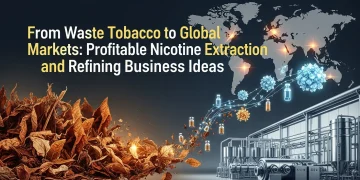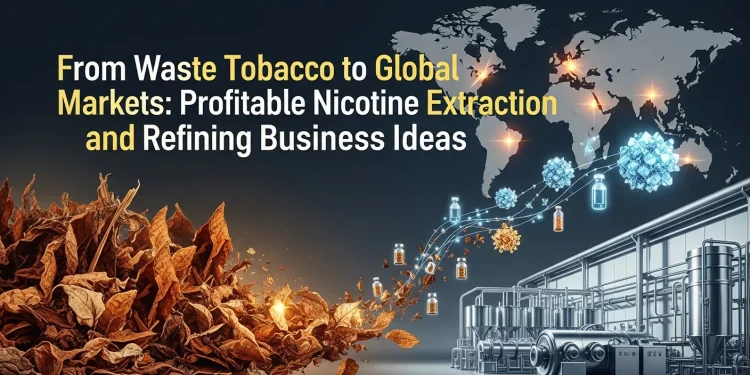Nicotine Extraction and Refining Business: Mostly nowadays, business owners are trying to find out the ways to take trash and make an innovative and useful item from it. One of the prominent instances of this ‘waste-to-use’ purpose could be to retrieve nicotine out of tobacco waste.
Rather than just tossing the spent tobacco leaves, stems, midribs, and dust, we should be able to recycle it to become a high value healable chemical in numerous pharmaceuticals, nicotine replacement therapies, export-grade e-liquids and even organic pesticide(Nicotine Extraction and Refining Business).
Because of these potent applications, nicotine extraction turns into a business of great value, sustainability and future profitability(Nicotine Extraction and Refining Business). This document tries to be simple and explain the market, sources of raw material, extractive procedures, quality parameters, possible future trades and motivational stories of achieved businesses(Nicotine Extraction and Refining Business).
Nicotine Extraction and Refining Business Market Opportunity: Why is This Business So Great?
The nicotine demand is increasing at an astonishing rate which is beyond just the production of cigarettes. There is a pharmaceutical need for nicotine to produce gums, patches and lozenge therapies for smoking cessation. The international market uses it for nicotine salts e-liquids for vaporizers.
There are organic farmers in some countries who use nicotine-based natural pesticides. This creates a multiplier effect for the above sectors and increases their demand for quality nicotine each year.
The worldwide market for nicotine has reached USD 600 million. That said, experts foresee it possibly nearing a value of USD 1,600 million by 2034(Nicotine Extraction and Refining Business).
Even though projected growth for the market has the potential to nearly triple, the market for various products, such as gums and pouches for nicotine, is experiencing annual revenue growth of 30% in some nations.
Read Our Project Report: Click Here
Despite being a major global player, India’s success in tobacco is all economic. Specifically, tobacco is cultivated and used as a resource, while at the same time massive tobacco waste is produced at little to no cost.
Tobacco is produced all year round in Andhra Pradesh, Karnataka, and Gujarat, and such states ensure a constant source for extraction facilities.
This business also supports clean and sustainable recycling. While tobacco waste directly pollutes the environment, the pollution is indirectly reduced by nicotine extraction.
The initiative also aligns with Swachh Bharat, Make in India and Atmanirbhar Bharat, all of which promote waste-related initiatives. Thus, the business will certainly be benefitted by robust economic growth while also improving environmental sustainability(Nicotine Extraction and Refining Business).

Raw Material: How Tobacco Waste is Transformed To A Prized Input-Nicotine Extraction and Refining Business
There is no shortage of tobacco waste, and its availability is generated by each stage of farming and processing. Waste generated by farmers is in the form of unwanted leaves and stems, while factories produce it during the cutting and handling processes. Dust and leftover pieces are generated by beedi and cigarette units.
Tobacco leaves are usually about 20%-30% waste, meaning for every ton of leaves, about 200-300 kg will be waste. Given that they are essentially free and have a nicotine concentration of 1%-7%, waste becomes a strategic resource. Of the different tobacco plants, Nicotiana rustica has a better yield and a higher nicotine concentration(Nicotine Extraction and Refining Business).
Entrepreneurs are well positioned to collect this waste resource using a variety of business actors such as famers, processing units, beedi factories, and tobacco auction centers. The transportation of tobacco waste is expensive, thus it makes economic sense to build a waste processing facility close to a tobacco growing region.
Nicotine Extraction: Process Overview-Nicotine Extraction and Refining Business
The process is simple when looked at step by step.
- First, the tobacco waste is dried and then milled to a fine powder. This maximizes the surface are exposed to the solvent, increasing extraction efficiency.
- Then, the powder is mixed with a solvent such as ethanol, which diffuses and pulls the nicotine out of the plant matrix.
- After, the liquid is filtered. The nicotine remains in the solution, which will be kept for the next step.
- Then, the solution is refined using distillation. The ethanol solvent is evaporated and, in that, it may be collected for further use. The ethanol free solution is the desired nicotine(Nicotine Extraction and Refining Business).
- Finally, high-grade nicotine can be extracted after the purification step, which involves the use of vacuum distillation or other similar techniques. This step makes the nicotine of higher quality and even suitable for pharmaceutical and exporting purposes.
Some of the necessary equipment needed for the extraction includes: dryers, grinders, extraction tanks, filters or centrifuges, distillation equipment, and some laboratory devices for quality testing(Nicotine Extraction and Refining Business). This work can easily be managed by small and medium companies when safety measures are put in place.
Read More: From Waste to Wealth: The Profitable Extraction of Nicotine from Tobacco Waste
Quality Control and Regulations: What You Should Follow
Due to the sensitive nature of testosterone, quality control measures are paramount. Each batch needs to be subjected to some laboratory testing using devices such as HPLC or GC to determine purity, moisture content, and any remaining solvent residues. Suppliers that are trustworthy are those that buyers are confident in, and such suppliers achieve consistency.
Safety regulations also need to be followed. Ensuring that the workers have gloves, masks, and protective eyewear is necessary. The building also needs to have adequate ventilation as well as fire safety measures. Preventative measures are important for proper training to mitigate accidents and keep processes running smoothly (Nicotine Extraction and Refining Business).
Legal regulations also need to be followed. For most units, having permits for pollution control, hazardous waste management, and an export IEC code is necessary.
If you’re producing pharmaceutical-grade nicotine, you might need a drug-related NOC. For nicotine sulfate, you need to register it as an insecticide. It’s worth mentioning that these regulations are in place to protect the public and encourage trust, making it easier to sell to larger buyers.
High-Value Nicotine Products You Can Sell-Nicotine Extraction and Refining Business
Waste nicotine has several valuable uses. Pharmaceutical-grade nicotine has the highest value, as it requires the highest purity for the manufacturing of oral gum, patches, and lozenges.
Nicotine salts are used in the liquid of e-cigarettes, and India is already one of the world`s largest exporters of e-cigarette nicotine salts.
Nicotine sulfate (40 percent) is also used in agriculture as a natural pesticide in organic farming.
Pharmaceutical and food industries also largely demand metabolites of nicotine, including Niacin and Niacinamide, as well as other tobacco waste derivatives such as Solanesol, which is used in the production of the valuable health supplement CoQ10. All these notes provide a variety of increasing options for entrepreneurs.
Read More: How to Start Manufacturing Business of Nicotine from Tobacco Waste
Import–Export Insights: Why India Has a Strong Advantage in Nicotine Extraction and Refining Business
India is also the largest exporter of nicotine in the world, and clearly, it has a competitive advantage in the nicotine industry. More than 50 percent of the nicotine in the world is exported from India. Large buyers include the USA, many European countries, Russia, and Switzerland.
Despite the large volumes of exported nicotine, India continues to import vast quantities of ultra-pure pharmaceutical-grade nicotine. This gap is an opportunity for new manufacturers to supply the pharmaceutical industry in India.
The Duty Drawback and Interest Equalization Scheme offered by the government supports exporters and assists businesses in increasing profitability. Given that nicotine is a valuable commodity, even minor exports lead to significant gains.
Read Our Book: Click Here
Success Stories from the Indian Subcontinent
Tobacco waste has a potential to create a successful business and that is what Alchem International is a proof of, a family business that has grown to be one of the largest producers of pure nicotine and a big player in the industry.
Another example is Nicosulf Industries, established in the 1980s with a focus on nicotine sulfate and eventually becoming a leading exporter of purified nicotine.
Additionally, large players have sought after the nicotine-based chemicals industry as well, Tata Chemicals, for example, looked into the nicotine to Vitamin B3 conversion. Cipla is another example that made Nicotex and sparked a need for the pharmaceutical-grade nicotine in the country.
Overall, these examples from the Indian Subcontinent demonstrate the tremendous potential of small businesses with the right goals and strategy.
How NPCS Can Support You-Nicotine Extraction and Refining Business
NPCS (Niir Project Consultancy Services) assists investors by providing extensive and professional business documents. Their documents detail the complete production method, what machines are needed, a breakdown of raw materials, the arrangement of the factory, the rules concerning quality, and forecasts about finances.
NPCS also assists with obtaining the license, legal paperwork, and market access. With explicit and practical data, NPCS services help you avoid mistakes, minimize business risks, obtain business loans, and start your business with the confidence needed to set up a nicotine extraction unit.
Find the Best Idea for Yourself With our Startup Selector Tool
Final Statement
Beginning a nicotine extraction business using the waste from tobacco is a valuable opportunity for business people. There is a lot of tobacco waste in India, a supportive government, and a great domestic and international market which is a valuable opportunity(Nicotine Extraction and Refining Business).
This business also takes waste and pollution reduction into consideration, as well as providing a quick return, and is safe. If you follow the rules for safety, then keep the quality high, and get guidance from experts, then you will be able to make a successful and scalable operation. This business also has a large financial return and it will help the environment.
FAQS-Nicotine Extraction and Refining Business
1.Is tobacco waste in India easy to get?
A.Yes. India makes a lot of tobacco, which means the waste is available all year.
2.Is the extraction of nicotine safe?
A.It is safe as long as you have the right protective equipment and follow the safety guidelines.
3.Is it possible for small startups to start this business?
A.Yes. Quite some successful companies started as small units and gradually grew.
4.How many licenses are required for this business?
A.You are required to get only a few key clearances, such as pollution control clearance and clearance for documents for exports. Extra permissions are required for pharma grade production.
5.Is it profitable to export nicotine?
A.Yes. India is the highest exporter and the demand is increasing worldwide every year.


















